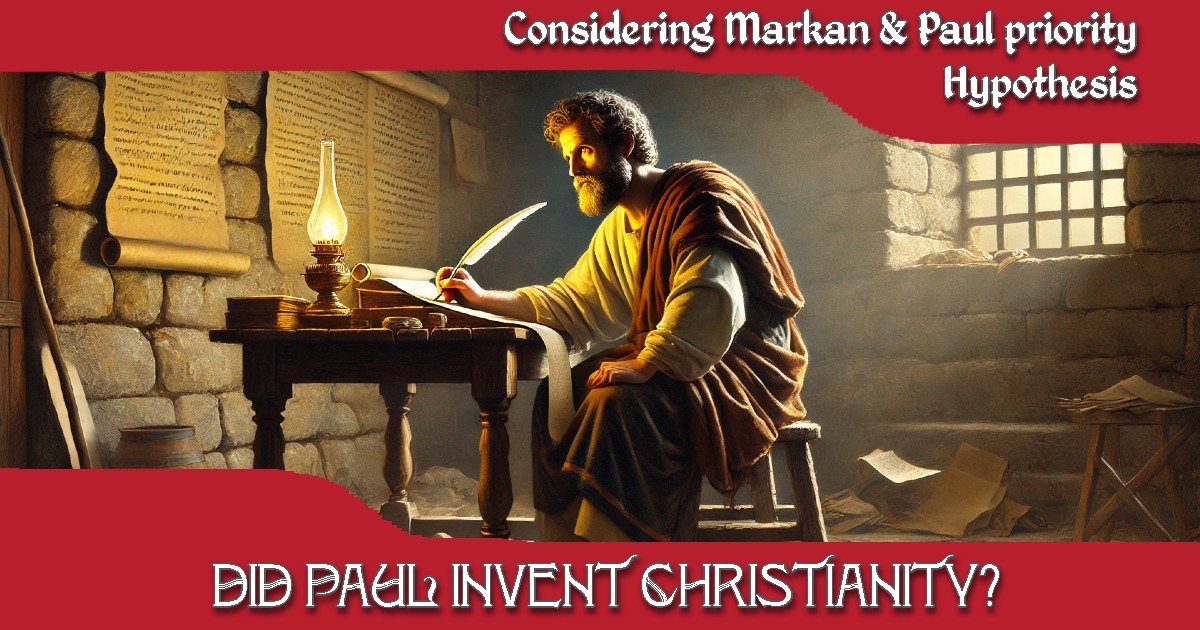Prepare to challenge everything you thought you knew about the origins of Christianity. What if the religion billions follow today wasn’t founded directly by Jesus, but instead by Paul of Tarsus? This isn’t just a fringe theory. It’s a provocative hypothesis supported by secular scholars and critical historians, grounded in the earliest Christian texts. Let’s dive into the evidence.
Paul vs. Jesus: Competing Messages?
When we examine the New Testament, we find an unsettling reality: Paul’s letters are the earliest Christian writings, predating the Gospels by decades. Paul never met Jesus in the flesh, yet his theological ideas dominate Christian doctrine. His focus is on faith in the death and resurrection of Christ (Romans 10:9), not on Jesus’ teachings about ethics, the Kingdom of God, or Jewish law—which are central in the Synoptic Gospels. Paul barely quotes Jesus. Instead, he presents a mystical Christ figure, often at odds with the historical, apocalyptic preacher depicted in the Gospels.
The Gospel of Mark: A Fictional Creation?
Enter the Markan Priority with Pauline Influence theory. Scholars like Richard Carrier argue that the Gospel of Mark—the first Gospel written—is a literary creation, heavily influenced by Paul’s theology. Mark doesn’t present eyewitness testimony; instead, he crafts an allegorical narrative using Pauline ideas and Hebrew scriptures as his foundation. For instance, Jesus’ passion closely mirrors Old Testament passages like Psalm 22 and Isaiah 53. The disciples are depicted as clueless, perhaps symbolizing Paul’s criticism of the Jerusalem apostles (Galatians 2).
Paul’s Conflict with the Original Apostles
Paul wasn’t exactly on friendly terms with Jesus’ original disciples. In Galatians 2:11-14, he openly confronts Peter, accusing him of hypocrisy. Paul even dismisses the authority of the Jerusalem leaders, asserting that his gospel came through revelation, not human tradition (Galatians 1:12). This raises a crucial question: If Paul had the “true” gospel, why was he in constant conflict with those who actually knew Jesus?
The Missing Historical Jesus in Early Texts
Oddly enough, Paul provides almost no details about Jesus’ life. No mention of his miracles, parables, or Bethlehem nativity. Paul focuses solely on Jesus’ death, resurrection, and cosmic significance. Compare this to later Gospels, filled with rich narratives. Is this because Paul’s Jesus was more of a spiritual construct than a historical figure?
Conclusion: A Shocking Possibility
While traditional Christianity views Paul as an apostle spreading Jesus’ message, secular investigations suggest something more radical: Paul may have invented a new religion centered on a divine Christ, distinct from the historical Jesus of Nazareth. The Gospels, especially Mark, could be theological narratives shaped to fit Paul’s vision.
Sources:
Markan Priority with Pauline Influence
These works explore how the Gospel of Mark may have been influenced by Pauline theology, alongside discussions on literary dependence and the development of early Christian texts.
William Wrede – The Messianic Secret (1901)
- A foundational work that examines how Mark’s Gospel constructs the “Messianic Secret,” possibly reflecting Pauline theological ideas.
Burton L. Mack – A Myth of Innocence: Mark and Christian Origins (1988)
- Argues that Mark was influenced by Pauline thought, presenting Jesus in a way that aligns with Paul’s theological framework.
David Oliver Smith – Matthew, Mark, Luke, and Paul (2011)
- Directly investigates how Pauline theology shaped the Synoptic Gospels, with a focus on Mark’s dependence on Paul’s letters.
Robert M. Price – The Amazing Colossal Apostle (2012)
- Explores the possibility of Pauline influence not just on Mark but on the broader Gospel tradition.
Adam Winn – The Purpose of Mark’s Gospel: An Early Christian Response to Roman Imperial Propaganda (2008)
- Suggests Mark’s Gospel is a response to both Roman imperial ideology and Pauline theology.
Joel Marcus – Mark 1–8: A New Translation with Introduction and Commentary (2000)
- Offers critical insights into how Pauline concepts may have shaped Mark’s portrayal of Jesus.
Pauline Christianity Hypothesis
These sources delve into how Paul’s theology may have defined early Christianity, differentiating it from the teachings of Jesus and other apostles.
Albert Schweitzer – The Mysticism of Paul the Apostle (1931)
- A classic work exploring Paul’s mystical theology and its foundational role in shaping Christian thought.
Gerd Lüdemann – Paul: The Founder of Christianity (2001)
- Argues that Paul, rather than Jesus, was the true founder of Christianity as we know it today.
Hyam Maccoby – The Mythmaker: Paul and the Invention of Christianity (1986)
- Suggests Paul diverged significantly from Jesus’ teachings, creating a new religion heavily influenced by Hellenistic thought.
James D. Tabor – Paul and Jesus: How the Apostle Transformed Christianity (2012)
- Explores how Paul’s theology reshaped the original Jewish movement of Jesus into a new religious framework.
John Gager – Reinventing Paul (2000)
- Offers a revisionist view of Paul, focusing on how his letters have been historically interpreted and misinterpreted.
Elaine Pagels – The Gnostic Paul (1975)
- Examines how Gnostic interpretations of Paul reveal diverse understandings of his theology in early Christian sects.
N.T. Wright – Paul and the Faithfulness of God (2013)
- Provides a comprehensive look at Paul’s theology, its Jewish roots, and its revolutionary implications for early Christianity.
Thomas Brodie – The Birthing of the New Testament (2004)
- Analyzes how Pauline theology may have influenced not just his own letters but other New Testament writings.
Richard Carrier – On the Historicity of Jesus (2014)
- While primarily addressing the historicity debate, Carrier also delves into the development of Pauline Christianity as a theological framework.
Would you like me to expand on any specific authors, theories, or provide a deeper summary of these works?

